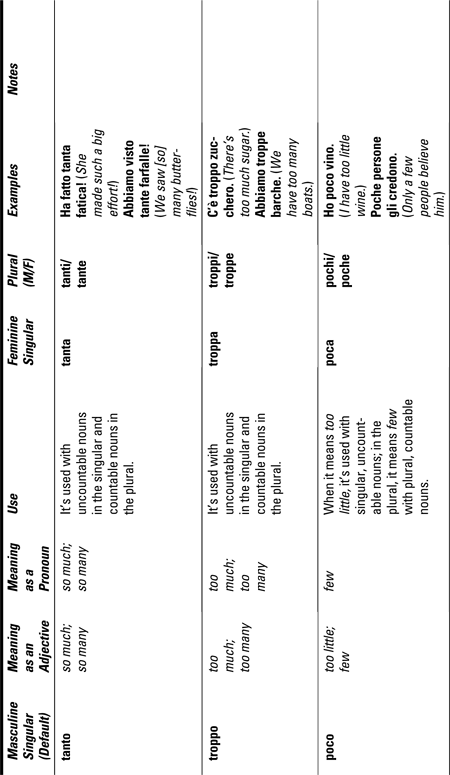Italian All-in-One For Dummies (124 page)
Read Italian All-in-One For Dummies Online
Authors: Consumer Dummies

Questo qui è il mio quaderno.
(
This [one] is my notebook.
)
When you employ them to point to a person, you often do it to convey a negative nuance:
Non ti fidare di questa qui.
(
Don't trust this one.
)
Non parlare a quello là .
(
Don't talk to that one.
)
 You can add an adjective to
You can add an adjective to
questo
or
quello
instead of repeating a noun and an adjective, as shown in this question and answer:
Vuoi la giacca blu o quella verde?
(
Do you want the blue or the green jacket?
)
Quella verde.
(
The green one.
)
Conveying Something Indefinite
This section shows you indefinite words that you can use as adjectives or as pronouns and indefinite words that you can use only as pronouns. Here, you also see how indefinite words can help you indicate a part of a larger whole, as in the following example:
Molti di noi non gli hanno creduto
(
Many of us didn't believe him
).
Molti
(
many
) is the part, and the larger whole is
noi
(
us
).
 Mind that in Italian indefinite adjectives and pronouns are often singular even though they may convey either a singular or a plural meaning. An example is the adjective
Mind that in Italian indefinite adjectives and pronouns are often singular even though they may convey either a singular or a plural meaning. An example is the adjective
qualche
(
some
) (which never changes its ending), as in the phrase
Abbiamo ancora qualche dubbio
(
We still have some doubts
). Another example is the pronoun
chiunque
(
anyone
):
Sono disposto a discutere della questione con chiunque!
(
I'm willing to discuss that issue with anyone!
)
Indefinite words used as adjectives or pronouns
Table 6-1
lists indefinite words that can be used as adjectives or pronouns and indicates which ones
 You can employ only in the singular, the plural, or both.
You can employ only in the singular, the plural, or both.
 Are invariable, which means that they come in only one form no matter the gender and number of the person or thing to which they refer. If they're singular (which is almost always the case), you conjugate the verb in the third person singular. If the verb is in a compound form, which includes the past participle, you use the past participle in the masculine singular â unless you're sure that the indefinite adjective or pronoun refers to a group of females.
Are invariable, which means that they come in only one form no matter the gender and number of the person or thing to which they refer. If they're singular (which is almost always the case), you conjugate the verb in the third person singular. If the verb is in a compound form, which includes the past participle, you use the past participle in the masculine singular â unless you're sure that the indefinite adjective or pronoun refers to a group of females.
 Vary in gender and number, ending in
Vary in gender and number, ending in
-o, -a, -i
or
-e;
or only in number, ending in
-e
or
-i.
You match variable indefinites with the nouns to which they refer, as you do with describing adjectives.






 In Italian, as in English, the indefinite adjectives/pronouns
In Italian, as in English, the indefinite adjectives/pronouns
both
and
either
are used only with plural, countable nouns. The most common phrase is
tutti e due
(masculine)/
tutte e due
(feminine), but you also see
ambedue
(masculine/feminine) and
entrambi
(masculine)/
entrambe
(feminine), especially in writing.
